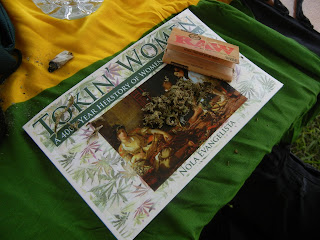 |
| Cup attendees from Puerto Rico. |
The first High Times Jamaican World Cannabis Cup was well
worth attending (and I was lucky enough to do so).
Held at a park right on the beach steps away from the swanky
Sandals/Beaches complex in Negril, the event featured exhibitor booths under
canopies, which worked against the afternoon rains that came nearly every day.
On sunny Saturday, attendance hit its peak with people from Kingston and other
parts of the island in attendance, as well as folks from all over the US, Central America and
Europe.
NORML had a booth and was able to re-invigorate its Jamaica
chapter at the event, with NORML founder Keith Stroup and Jamaica NORML founder
Paul Chang attending, and new volunteers Linda Jackson, Linda Browne and
Sharifah wo-maning the booth where many attendees signed up to stay in touch.
The event came as Jamaica has legalized possession of two
ounces of ganja for all, as well as a religious exception for Rastafaris, and
is expected to issue regulations for sales. It was held under the religious
exemption as a Rasta Rootzfest, and Jamaican Minister of Justice Marc Golding,
who has been a proponent of religious freedom, spoke at the opening ceremonies.
 |
| Someone finds another use for Tokin’ Women at the event. |
I brought promotional copies of my new book Tokin’ Women: A 4000-Year Herstory and was interviewed on IrieFM by famed DJ Mutabaruka, who
informed me that the Rastas sing about the Queen of Sheba bringing ganja to
Solomon, a conclusion I also reached. I also got to meet Charlo Greene, the
Alaska newscaster who famously quit on the air in order to work for marijuana
legalization in her state. We’ve been in touch, and I plan to add her to the final
first edition of Tokin’ Women.
At night the program was filled with the sounds of The
Mighty Diamonds, Tarrus and more, and during the day, a high-level program was
held with Jamaican government officials talking about the future of ganja laws. High Times cultivation editor Kyle Kushman, who got married
at 4:20 on Thursday at the event, was rhapsodic about the possibilities of
bringing more modern agricultural techniques to the island, known for its ganja
tourism.
 |
| Miss High Times stops by the NORML booth. |
The winners of the World High Times Cup were mostly from the
US and Amsterdam,
with the Jamaican Cup winners from Orange Hill in Westmoreland, and the St.
Bess /Elizabeth and St. Ann regions.
Charles Nesson, an attorney and professor from Harvard Law School, was also presented with an award. Nesson defended Daniel Ellsberg in the Pentagon Papers case, brought suit on NORML’s behalf in Massachusetts, and told Salon he is “interested in advancing Justice in Jamaica…as well as national drug policy.” Nesson called Jamaica a testing ground for regulation in California, because of its large community of outlaw growers.
At the Drug Policy Alliance conference in Washington, DC immediately following the cup, doctoral student Vicki Hanson from the University of West Indies in Kingston spoke on a panel titled, “Ensuring Inclusion, Repairing Damage: Diversity, Equity and the Marijuana Industry” about the need for land reform for farmers in a nation where much of the ganja comes from guerilla grows on public lands. Hanson was chosen to speak at the closing plenary at the conference, which hosted 1500 attendees from 71 countries. DPA's Ethan Nadelmann said we must remember “the farmers and peasants the world over who have lost their livelihood because the plant they were growing was deemed illegal….and we must hold accountable some of those people who justified and allowed those policies to stay in place.”
Big ups to all who put these great events together and hope to see you all in Jamaica next year, and in Atlanta in 2017 for the next DPA conference.
(P.S. Rumors that Rihanna was at the Cup promoting a new brand of cannabis remain unconfirmed. I didn't see her.)
Charles Nesson, an attorney and professor from Harvard Law School, was also presented with an award. Nesson defended Daniel Ellsberg in the Pentagon Papers case, brought suit on NORML’s behalf in Massachusetts, and told Salon he is “interested in advancing Justice in Jamaica…as well as national drug policy.” Nesson called Jamaica a testing ground for regulation in California, because of its large community of outlaw growers.
At the Drug Policy Alliance conference in Washington, DC immediately following the cup, doctoral student Vicki Hanson from the University of West Indies in Kingston spoke on a panel titled, “Ensuring Inclusion, Repairing Damage: Diversity, Equity and the Marijuana Industry” about the need for land reform for farmers in a nation where much of the ganja comes from guerilla grows on public lands. Hanson was chosen to speak at the closing plenary at the conference, which hosted 1500 attendees from 71 countries. DPA's Ethan Nadelmann said we must remember “the farmers and peasants the world over who have lost their livelihood because the plant they were growing was deemed illegal….and we must hold accountable some of those people who justified and allowed those policies to stay in place.”
Big ups to all who put these great events together and hope to see you all in Jamaica next year, and in Atlanta in 2017 for the next DPA conference.










